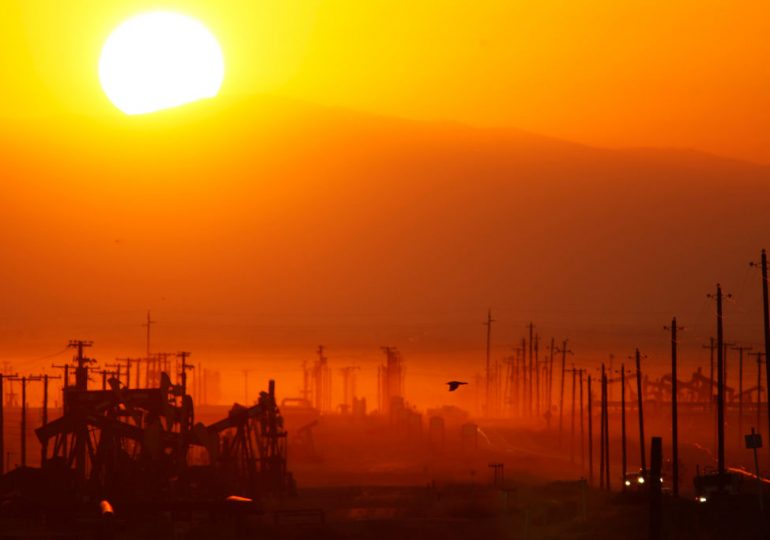James Hansen first warned Congress of the threat from climate change in 1988. Today, in a controversial new peer-reviewed paper published in Oxford Open Climate Change, he brings a new warning: Scientists are underestimating how fast the planet is warming. And the crisis will have to be met, in part, with geoengineering.
[time-brightcove not-tgx=”true”]
According to the report, earth will pass 1.5°C of cumulative warming this decade, and exceed 2°C of warming before 2050. Scientists think that warming in excess of 2°C could unleash more dangerous effects, like the collapse of Antarctic ice sheets, leading to rapid sea level rise. Limiting warming to 1.5°C, and at least keeping it well under 2°C, is the goal of the Paris Climate Accord, with international policymakers gathering at yearly COP meetings to negotiate actions to meet that goal.
Climate scientists have been underestimating how sensitive the global climate system will be to increased carbon dioxide emissions, according to the new paper. That’s in part because they have been improperly accounting for the effect of sulfur dioxide emissions from coal power plants and ships burning bunker fuel, which mask warming. Sulfur dioxide emissions, in the form of aerosols in the atmosphere, have the effect of reflecting sunlight, but they are also hazardous to human health. In recent years, regulations around the world have caused sulfur dioxide emissions to fall. That’s likely helped reduce air pollution responsible for millions of deaths every year, but, according to Hansen, the tradeoff has been accelerated warming. This, he says, is part of the reason for the record warming much of the Northern Hemisphere experienced this summer.
“Humanity made a Faustian bargain by offsetting a substantial but uncertain fraction of greenhouse gas warming with aerosol cooling,” Hansen said alongside other scientists in a webinar introducing his new paper on Nov. 2. “Now, as we want to reduce all the chronic health effects of aerosols, our first Faustian payment is due.”
Read more: A Controversial Technology Is Creating an Unprecedented Rift Among Climate Scientists
Hansen, an adjunct professor of earth and environmental sciences at Columbia University, has often been a critic of mainstream climate policy. In 2015, after the Paris Climate Accord was adopted, he labeled the agreement “a fraud” because it did not include mandates to tax fossil fuels in order to discourage them from being burned.
Emissions cuts alone will not be enough to ensure a safe climate in future years, according to Hansen and his collaborators. Governments will have to impose carbon fees to help rapidly draw down emissions, they argue, adding it will also be necessary to research and deploy techniques to reduce incoming solar radiation, also known as solar geoengineering.
Such methods, which can include releasing sulfur dioxide into the stratosphere, or spraying seawater into the air to form clouds, are highly controversial, with many researchers warning of dangerous, potentially unintended consequences. Currently, the main debate among the largest body of climate scientists is whether to even begin funding research into geoengineering in case humanity needs it, or if putting the option on the table is too dangerous to consider. Few hold the position, as argued in the new paper, that geoengineering deployment will definitely be necessary.
“The 2°C warming limit is dead, unless we take purposeful actions to alter the earth’s energy imbalance,” Hansen said in the webinar.
“We have to recognize we’re geoengineering the planet right now [with greenhouse gasses],” Hansen added later, in response to a question from TIME. “We have to minimize that human-made geoengineering. And, on a temporary timescale, that will probably require reflecting sunlight, just because of how difficult it is to get the greenhouse gasses out of the atmosphere.”
Read more: Inside a Controversial Startup’s Risky Attempt to Control Our Climate
Hanson and his collaborators’ findings on the severity of warming and the necessity for geoengineering fall largely outside the broad conclusions made by international climate scientists from the U.N. Intergovernmental Panel on Climate Change. In part, they result from a reassessment of prehistoric climate data. Those interpretations are disputed by Michael Mann, a well-known climate scientist at Pennsylvania State University, in a commentary published on Nov. 1.
“I come away with very different conclusions about what we collectively learn from the Cenozoic, cooling, the Pliocene, and the Holocene. Basically, they tell us that climate models have the climate sensitivity… about right,” Mann writes. He also disputes Hansen’s conclusions that recent shipping emission rules have substantially affected recent warming.
Mann calls Hansen’s arguments for the necessity of solar geoengineering, “misguided policy advocacy.”
“The authors are promoting the unprecedented, and potentially very dangerous, ‘geoengineeering’ gambit of attempting to manipulate our planetary environment,” Mann writes. “This desperate action is motivated by what I consider to be a fallacy, advanced by the article, that large-scale warming will be substantially greater than current-generation models project.” (Current models say that carbon dioxide emissions will warm the atmosphere a lot less compared to Hansen’s analysis.)
According to Mann, the climate situation is still extremely dire. But it is a situation that concerted efforts to decarbonize our economy can address, without resorting to geoengineering.
Other scientists are softer on the paper’s temperature predictions, but echo Mann’s concerns about the dangers of geoengineering.
“Much of Jim’s analysis is credible,” writes Michael Oppenheimer, a climate scientist at Princeton University, over email. “However, I disagree on the solution: using [aerosols] to geoengineer the climate. No outdoor experiments should be done and no implementation of this approach considered until there is a framework for global governance of geoengineering of this type in place, agreed to by a broad swath of countries.”
Leave a comment
















